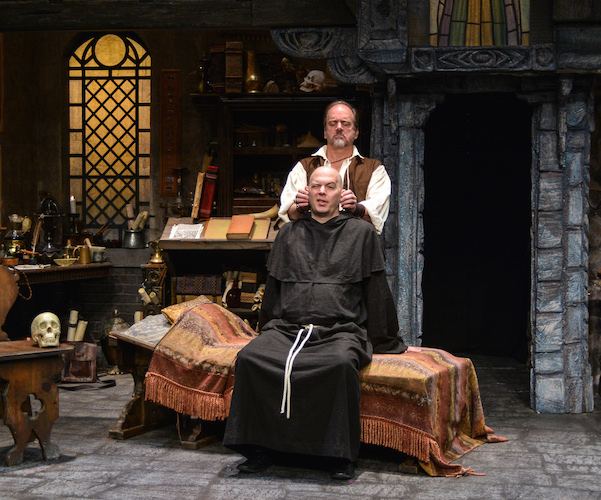Theater Review: Viva “Wittenberg” at Peterborough Players
David Davalos’s fast-paced wittiness and director Keith Stevens’s deft management of the dramatist’s words and action keep us in stitches.
Wittenberg by David Davalos. Directed by Keith Stevens. Staged by the Peterborough Players, 55 Hadley Road, Peterborough, New Hampshire, through September 10

L to R: Tom Frey as Martin Luther and Chris Mixon as Doctor Faustus in the Peterborough Players production of “Wittenberg.” Photo: Will Howell.
By Jim Kates
Both sequentially and atmospherically, David Davalos’s Wittenberg follows hard on the heels of the Peterborough Players’ production of George Bernard Shaw’s The Doctor’s Dilemma. The comedy crackles with cleverness and paradox and untrammeled talk. But the scripts draws as much from intellectual gymnastics of Tom Stoppard as it does from Shaw, not just the former’s Rosencrantz and Guildenstern Are Dead and Shakespeare in Love, but his Travesties.
Travesties, you may remember, capitalized on the incongruous, simultaneous presence of TristanTzara, James Joyce, and Vladimir Lenin in Zürich before World War I. Similarly, Davalos brings together three figures indelibly associated with the University of Wittenberg in the early sixteenth century, Martin Luther, “John” Faust, and Prince Hamlet of Denmark, and throws them into metaphysical and theatrical collision with one another. Part of the fun for the audience is knowing more than they do about what will become of them.
The text of Wittenberg is as thick with allusions and citations as a medieval dissertation, from Aristotle to Sartre — and, yes, Shaw — but not scholastically so. (Harry Feiner’s Gothic pile of a set is a masterpiece of allusion in its own right.) The audience catches the references as they fly by in the air. “To be or not go be” is played on from beginning to end, beaten into the ground in a merry dance. You would need to read the script in order to pick up the revelations about Faust and Luther in all their incarnations as well as the many other allusions, but that isn’t necessary to enjoy the production. When Hamlet contemplates a skull in Faust’s scriptorium, we sense the coming of an infinite jest. Davalos’s fast-paced wittiness and director Keith Stevens’ deft management of dramatist’s words and action keep us in stitches. Thanks as much to Stevens as to the playwright, the horses of the night run swiftly indeed.
The first act is far more original and lively than the second, with genuine debate swirling around Faust’s engagement with the philosophical world and Luther’s with the spiritual, while Hamlet sorts through the arguments of belief and doubt that we know will be consequential to him back home in Elsinore. In the second act, Hamlet becomes more of an Everyman contested conventionally by these arguments, and the outcome of the play itself is determined, not illuminated, by the known fates of the fictional Faust and the historical Luther. The second act relies perhaps too much on quick one-line laughs (especially those about academic culture) at the expense of development and resolution. But the laughs are there, and Wittenberg remains amusing to the very end.
And the script remains human, too, rather than programmatic. Tom Frey’s Martin Luther is no anti-papal bull in a church china shop, but a character of genuine reflection as well as conviction. Frey subtlety uses the natural narrowness of of his register to convey intellectual tension. In the first act, by contrast, Chris Mixon plays a slippery snake of a Faust, up and down and back and forth. As he eloquently champions questions over answers ,and science over faith, you can’t help but wonder about his motives — could this be the devil at work, asserting his power to assume pleasing shapes? In the second act, while the figures battle over Hamlet’s soul, Mixon settles into a more standard role, serving as a mirror to Frey’s Luther, who is obsessed with his own ideas.
Jeremy Beck’s Hamlet is all elemental undergraduate. He comes across so delightfully callow, eager to learn, and uncertain regarding where and how and what to learn, that we know he belongs at the university. The dramatic irony generated by our own knowledge of his eventual decision-making adds to the actor’s success, the puppiness of his characterization. Beck is given some of the most pyrotechnical lines in the play; he has not yet learned to pronounce them trippingly on the tongue, but this awkwardness adds to the sense that the figure is unformed, a temptation for others to lick into shape.
Mixon and Beck are both new to the Peterborough Players. I hope we see more of them in productions and seasons to come.
Jim Kates is a poet, feature journalist and reviewer, literary translator and the president and co-director of Zephyr Press, a non-profit press that focuses on contemporary works in translation from Russia, Eastern Europe, and Asia. His latest book is Muddy River (Carcanet), a translation of verse by Russian existentialist Sergey Stratanovsky. His translation of Mikhail Yeryomin: Selected Poems 1957-2009 (White Pine Press) won the second Cliff Becker Prize in Translation.
Tagged: David Davalos, Jim Kates, Keith Stevens, Peterborough Players
